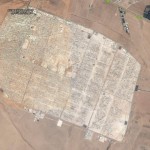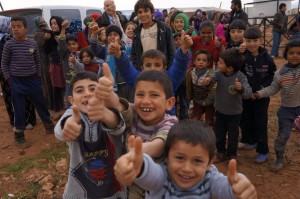January 29th, 2016
Zaatari: Day 2 with Syrian Refugees
Ahmad Yousaf, MD
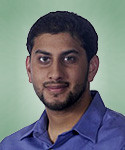
Ahmad Yousaf, MD, is the 2015-16 Ambulatory Chief Resident in Internal Medicine at Rutgers New Jersey Medical School.
This is my second post about my trip to the Zaatari Refugee camp in Jordan with the Syrian American Medical Society (SAMS). I will continue to share my daily journal entries with you in hopes of educating the American medical and nonmedical communities about what I saw, erasing the irrational fears that have guided the discussion of refugees in this country, and as a form of therapy for myself.
Reflections from Day #2 with Syrian refugees:
There were two moments today that are going to be hard to forget.
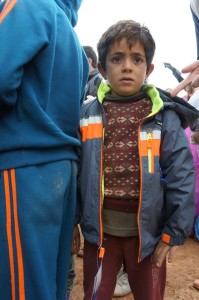
1) When I’m caring for children, I often make corny old doctor jokes with moms and their kids in the office in America. This day in the Zaatari clinic, two children with viral infections came into the exam room with their mother. Their mother, a woman in her mid 20’s, was concerned her kids kept getting sick. I asked if they played with a lot of other kids or go to school. She said that they are often with a lot of the other refugee kids. I made my ‘go-to’ joke: “At ages 4 and 6, children hate sharing anything with each other, except for the things we do not want them to share. They love to share their boogers and illnesses with each other, their mamas, and their papas …” There was a pause… It was heavy. I had 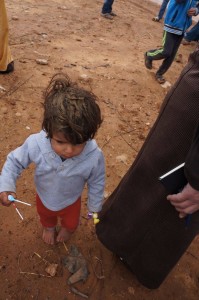 assumed that the children’s father was alive, not imprisoned, and not separated from his family in the escape from Syria. The mom’s eyes welled up with tears. “They don’t have a papa anymore.” The words hit me hard, and shame overwhelmed me. I thought of my own baby girl and the absolute terrible thought of her not having me to love her, care for her, protect her, and provide for her. I offered weak condolences and tried to refocus on the kids’ infections. Before they left, we stuffed extra lollipops in their pockets and gave them hugs. We can treat the infections, but how do you treat a problem that doesn’t have a cure?
assumed that the children’s father was alive, not imprisoned, and not separated from his family in the escape from Syria. The mom’s eyes welled up with tears. “They don’t have a papa anymore.” The words hit me hard, and shame overwhelmed me. I thought of my own baby girl and the absolute terrible thought of her not having me to love her, care for her, protect her, and provide for her. I offered weak condolences and tried to refocus on the kids’ infections. Before they left, we stuffed extra lollipops in their pockets and gave them hugs. We can treat the infections, but how do you treat a problem that doesn’t have a cure?
2) A mother came in with four children who all had chronic coughs and congestion issues. The mother was funny and warm, and when I asked her what her kids’ names were, she said the names of her three older sons and then the name of her youngest daughter, Shaam. She looked at us with a smile and said: “That is where we are from in Syria. We love that place, and my daughter is a reminder that we will love the day we finally get to go home with her.”
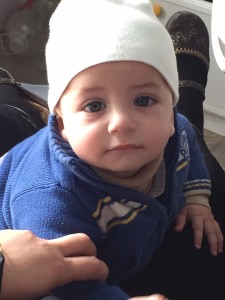 Shaam was born a refugee. She knows nothing of her homeland. Her entire life has been spent in a shipping container that has served has her temporary abode in the camp. May her parents’ wish be granted that she one day return to her namesake.
Shaam was born a refugee. She knows nothing of her homeland. Her entire life has been spent in a shipping container that has served has her temporary abode in the camp. May her parents’ wish be granted that she one day return to her namesake.
Photography by Amal Rass and Joshua Margaritondo
It has now been almost 2 weeks since my return, and I still have images of the children of Zaatari imprinted in my memory. I hold up my own 2-year-old daughter and look into her eyes, knowing that if I work hard, I will provide her with everything she ever needs. The children of Zaatari do not have that. Their fathers have been killed, imprisoned, or stripped of any opportunity to protect them or provide for them. Their mothers are left caring for entire families. (I saw one woman caring for 12 children, mostly nephews and nieces who had been orphaned.) Many of the caregivers are teens. The devastating war that has ravaged Syria is still ongoing — the factor that actively produces Syrian refugees is still happening. And for the most part, we do nothing. That feeling of hopelessness is immense.

